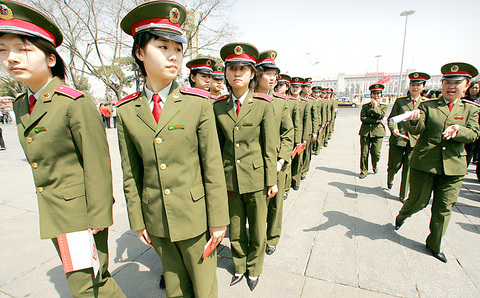China warned the public against staging fresh protests when Japanese Foreign Minister Nobutaka Machimura visits this weekend in an attempt to head off a repeat of last week's violent anti-Japanese demonstrations.
Thousands took part in protests in at least four Chinese cities last Saturday and Sunday, and Internet chatrooms, e-mails and mobile phone messages have been urging people to join a new round of protests in cities across China this weekend.
Foreign missions, wary of possible violence after demonstrators threw rocks and eggs at Japanese diplomatic missions and attacked Japanese businesses last week cautioned their citizens about new protests.

PHOTO: AFP
The demonstrations, triggered by what many see as Japan's failure to own up to World War II atrocities, come at a time that Japan is seeking a permanent seat on the UN Security Council, a move that China firmly opposes.
While last weekend's protests appeared to have had tacit state approval, the government appealed to demonstrators to avoid "extreme activities" and yesterday Beijing police warned against "unapproved or harmful" activities.
"Any assemblies, protests and demonstrations should be approved by the public security organ," the China News Service quoted a Beijing police spokesman as saying.
Unapproved and harmful activities were "illegal" and would be punished, it said.
For its part, Japan pledged not to let a series of disputes with China hinder their broader relationship.
"We must deepen mutual understanding and trust through dialogue and not allow individual issues to become an obstacle to the development of the overall Japan-China relationship," the Japanese Foreign Ministry said in an annual diplomatic report.
Machimura flies to Beijing tomorrow to meet Chinese Foreign Minister Li Zhaoxing (
Tokyo, through the Japanese chamber of commerce in China, warned Japanese firms to be on guard against possible protests. Japanese diplomatic missions in China have also cautioned Japanese in China about the protests, Chief Cabinet Secretary Hiroyuki Hosoda said.
"It seems the Chinese side is making various efforts. I would like to monitor the situation," Hosoda told reporters.
The Foreign Ministry in Tokyo, meanwhile, issued an annual report that accused China of threatening Japanese security in a series of incidents including illegal prospecting for oil in Japan's exclusive economic zone and an incursion into Japan's territorial waters.
The report cited China's undersea resource explorations in disputed waters in the East China Sea and an incursion by a Chinese nuclear submarine in those waters last year, calling them "serious problems that threatened Japan's national security, sovereignty and other rights."
However, despite such problems, it is important to build trust and understanding through dialogue, the report said.
"Stability in Japan-China relations is crucial for peace and stability in the Asia-Pacific region," the report said. "And we agreed on the need for dialogue despite difference in opinions in specific areas."

SECURITY: As China is ‘reshaping’ Hong Kong’s population, Taiwan must raise the eligibility threshold for applications from Hong Kongers, Chiu Chui-cheng said When Hong Kong and Macau citizens apply for residency in Taiwan, it would be under a new category that includes a “national security observation period,” Mainland Affairs Council (MAC) Minister Chiu Chui-cheng (邱垂正) said yesterday. President William Lai (賴清德) on March 13 announced 17 strategies to counter China’s aggression toward Taiwan, including incorporating national security considerations into the review process for residency applications from Hong Kong and Macau citizens. The situation in Hong Kong is constantly changing, Chiu said to media yesterday on the sidelines of the Taipei Technology Run hosted by the Taipei Neihu Technology Park Development Association. With

A US Marine Corps regiment equipped with Naval Strike Missiles (NSM) is set to participate in the upcoming Balikatan 25 exercise in the Luzon Strait, marking the system’s first-ever deployment in the Philippines. US and Philippine officials have separately confirmed that the Navy Marine Expeditionary Ship Interdiction System (NMESIS) — the mobile launch platform for the Naval Strike Missile — would take part in the joint exercise. The missiles are being deployed to “a strategic first island chain chokepoint” in the waters between Taiwan proper and the Philippines, US-based Naval News reported. “The Luzon Strait and Bashi Channel represent a critical access

‘FORM OF PROTEST’: The German Institute Taipei said it was ‘shocked’ to see Nazi symbolism used in connection with political aims as it condemned the incident Sung Chien-liang (宋建樑), who led efforts to recall Democratic Progressive Party (DPP) Legislator Lee Kun-cheng (李坤城), was released on bail of NT$80,000 yesterday amid an outcry over a Nazi armband he wore to questioning the night before. Sung arrived at the New Taipei City District Prosecutors’ Office for questioning in a recall petition forgery case on Tuesday night wearing a red armband bearing a swastika, carrying a copy of Adolf Hitler’s Mein Kampf and giving a Nazi salute. Sung left the building at 1:15am without the armband and apparently covering the book with a coat. This is a serious international scandal and Chinese

COUNTERINTELLIGENCE TRAINING: The ministry said 87.5 percent of the apprehended Chinese agents were reported by service members they tried to lure into becoming spies Taiwanese organized crime, illegal money lenders, temples and civic groups are complicit in Beijing’s infiltration of the armed forces, the Ministry of National Defense (MND) said in a report yesterday. Retired service members who had been turned to Beijing’s cause mainly relied on those channels to infiltrate the Taiwanese military, according to the report to be submitted to lawmakers ahead of tomorrow’s hearing on Chinese espionage in the military. Chinese intelligence typically used blackmail, Internet-based communications, bribery or debts to loan sharks to leverage active service personnel to do its bidding, it said. China’s main goals are to collect intelligence, and develop a